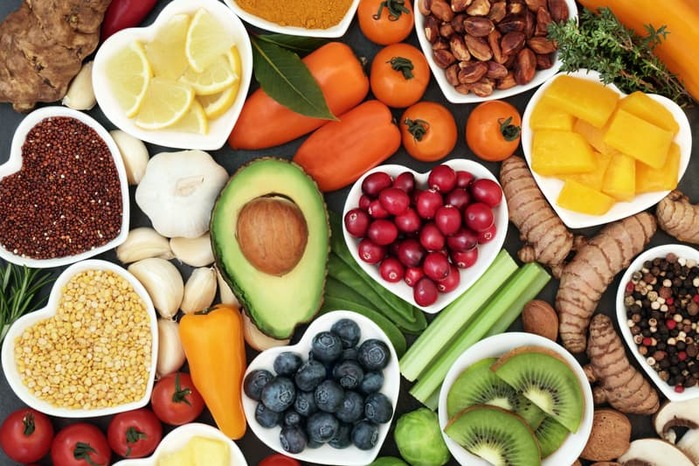- Calls to this hotline are currently being directed to Within Health or Eating Disorder Solutions
- Representatives are standing by 24/7 to help answer your questions
- All calls are confidential and HIPAA compliant
- There is no obligation or cost to call
- Eating Disorder Hope does not receive any commissions or fees dependent upon which provider you select
- Additional treatment providers are located on our directory or samhsa.gov
What Should I Eat to Feel Good?
Eating to feel good is a combination of health and happiness. It is often believed, if we go on a diet or take foods away, we will feel healthier, happier, and more in control. Media and trends fuel this idea that to be happy and healthy we must change our bodies rather than listen to our bodies.
When focus shifts from health to vanity, happiness starts to become farther from our reach. When we don’t achieve happiness from the first diet, we then think the next diet, exercise, or health trend must be the answer to feeling good.
What Does Feeling Good Mean to You?
Before we answer what should be eaten to feel good, we must first explore what it means to feel good.
Each person is going to define feeling good differently. Feeling good may be related to physical or emotional health.
Some may define feeling good as being confident, energized, strong, or resilient. Others may define feeling good as looking good.
What we eat is very much woven into what we believe feeling good means. We physically and emotionally respond to how food tastes, how much it costs, how media portrays it, events involving food, and emotions provoked by food.
Before reading on, identify what feeling good means to you. I encourage you to explore eating for all that’s functioning on the inside of the body, rather than the outside.
Nourishment to Feel Good
The recipe to feeling good includes nourishing not only the physical body, but the mind, desires, and cravings. The path to feeling good should focus on adding food instead of taking it away. Let’s explore how increasing nutrition supports overall well-being.
Nourishing the Body
When nourishing the body, it’s important to incorporate variety and inclusion of all macronutrients and micronutrients. Macronutrients include carbohydrates, proteins and fats. Micronutrients include vitamins and minerals.
When looking to optimally nourish the body always ask what’s missing? If following a diet trend, most likely nutrients are being missed or eliminated. So, what could be missing and causing you to feel bad?
Carbohydrates:
Many diet trends restrict carbohydrates, labeling grains, fruits, beans, legumes, sugar, and milk as the problem. Carbohydrates are the body’s primary source of fuel and without these foods the body cannot optimally function.
If carbohydrates are restricted, you may experience:
- Brain fog or forgetfulness
- Fatigue and weakness
- Headaches
- Constipation
- Bad Breath
- Vitamin and mineral deficiencies
Instead of focusing on taking food away, focus on what you can add. Think again, what you are missing? Do you include fiber from whole grains and fruit to support heart health and digestion? Do you get enough calcium from sources of dairy to support bone health?
The answer to feeling good is not creating food rules or to deem foods off limits. Realistically, taking whole foods groups away means taking positive nourishment from the body. Remember the body needs 45-65% of its energy to come from carbohydrates.
Fats:
Fat is essential for absorbing fat-soluble vitamins, protecting the body, regulating hormones and more. About 25-35% of energy needs should come from fats including cooking oils, butter, nuts, seeds, olives, avocado, and fatty fish.
If restricting fat, you can experience:
- Depression
- Night blindness
- Muscle pain
- Dermatitis
- Hair loss
- Weakened immune system
- Vitamin deficiencies
Fat also increases enjoyment of the flavor and texture of food increasing satisfaction. Instead of taking fats away, try adding chopped nuts to your yogurt, olive oil as a dressing, or avocado to your sandwich.
Related Reading
- Nutrition Counseling for Eating Disorders
- How Does Your Metabolism Work
- What Are the Physical Cues of Hunger and Satiety?
- Dietitian Meal Planning
- How to Gain Weight In Recovery
- The Misconceptions of Healthy Eating
- Appetite Awareness
Proteins:
Protein is essential for strengthening and repairing the body’s tissues and organs. Protein is needed to provide essential amino acids or tissue building blocks. Essential nutrients are not produced by the body and can only obtained through eating protein.
The body needs 10-30% of its energy to come from protein daily. Some complete proteins or proteins with all amino acids include meat, fish, cheese, eggs, and tofu.
If restricting protein, you can experience:
- Brittle nails, hair and skin
- Injury
- Fatigue
- Fluid retention or edema
- Weakened immune system
- Vitamin and mineral deficiencies
Looking at where protein is missing can provide an understanding for where it can be added. For example, protein can often be lacking in vegetarian and vegan diets leading to iron deficiency, anemia and fatigue.
To increase protein try adding eggs to breakfast, tofu or shrimp to a stir-fry, and cheese to a snack.
Nourishing Desires
We all have foods we crave and experience pleasure from. For some these foods are savory and for others sweet. Often, these foods are labeled as “bad” and thought to only be okay occasionally.
Deprivation from the foods we enjoy increases the draw towards these foods. Eventually, leading many to having these foods not in moderation, but to overeat or even binge.
After having and even enjoying desired foods, guilt and shame are a result of labeling foods as bad or off limits. The thought is, if I ate a bad food, I must then be bad?
What if “bad” foods didn’t exist. What if all foods were good and all foods were allowed? Now this isn’t to say go in the opposite direction and eat dessert for every meal. Balance with nourishing foods and desired foods is key to feeling good and having confidence to listen to your body and honor its desires.
No One Right Way to Eat to Feel Good
It is important to understand why we make decisions around food. We are all born with an innate ability to listen to what our bodies need. As we grow and learn we are influenced by environmental factors disconnecting us from listening to the body.
Eating to feel good involves intuitively connecting to and hearing what, when and how much to eat. Intuitive eating has been shown to be negatively related to disordered eating and weight cycling and is positively associated with psychological health, weight stability, and body satisfaction [1].
When unconditional permission is given to eat, individuals can connect with true hunger and satiety. The goal of intuitive eating is to shift from weight preoccupation to an overall focus on well-being [1] or feeling good.
Everyone is an individual and because of that, nourishing the body and mind will look different. Healing the relationship with food, body and mind will support the shift from meeting society’s expectations, to focusing on your own wants and needs.
For more support and guidance in eating to feel good in your body, explore meeting with a Registered Dietitian.
Resources:
- [1] Sorensen, M. D., Arlinghaus, K. R., Ledoux, T. A., & Johnston, C. A. (2019). Integrating Mindfulness Into Eating Behaviors. American Journal of Lifestyle Medicine, 13(6), 537–539. https://doi.org/10.1177/1559827619867626
Author: Raylene Hungate, RDN,LD/N


